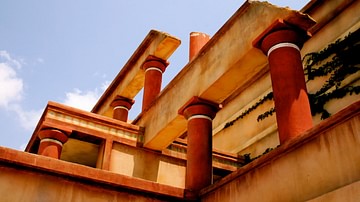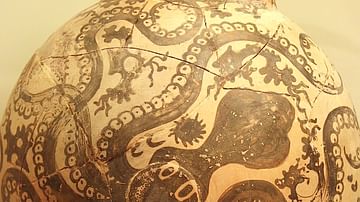Server Costs Fundraiser 2024
Help our mission to provide free history education to the world! Please donate and contribute to covering our server costs in 2024. With your support, millions of people learn about history entirely for free every month.
$3889 / $18000
Video
Often referred to as the Pompeii of the Aegean, Akrotiri is a settlement that was completely covered by pumice after the eruption of Thera in the late 17th / early 16th century BCE. Thera, the name of both the island and the volcano erupted and conserved the site, much like the site of Pompeii after the eruption of Vesuvius in 79 CE. Unlike Pompeii though, no human remains were found on Akrotiri and evidence at the site shows that there was an attempt to clear the rubble. This means it was likely that there was a gap between the earthquakes and the eruption and many of the residents had likely already fled the town before the eruption.
Although there were no human remains found, the buildings and architectural features, decorations and moveable goods, were all preserved by the eruption. The town was well planned and had squares and wide streets with each building facing onto either a square or a street. One of the most fascinating discoveries at Akrotiri is the fact that almost all of the buildings have painted designs on the interior walls. The Akrotiri frescoes in both art style and subject also show influence from the Minoan civilisation with religious processions, goddesses, lilies and crocuses.
The site of Akrotiri was discovered on the modern-day island of Santorini in the 19th century with the excavations of the archaeological site beginning in 1967 under Spyridon Mrinatos and continuing from 1974 onwards under Christos Doumos. The town, its paved streets, buildings, artefacts and detailed wall paintings have all survived, and give us a glimpse into the life of the Middle Bronze Age in the Aegean.
— SUPPORT US VIA OUR PATREON—
https://www.patreon.com/join/whencyclopedia
— BUY OUR MERCH —
https://www.worldhistory.store/
— CHAPTERS —
0:00 Introduction
1:00 Introduction to Akrotiri and Santorini
1:50 The Early History of Akrotiri
4:00 The Eruption of Thera
7:04 The Akrotiri Frescoes, Art and Architecture
9:59 Bronze Age Book Recommendation
10:37 Outro
— WANT TO KNOW MORE? —
Thera https://www.worldhistory.org/thera/
Akrotiri Frescoes https://www.worldhistory.org/article/673/akrotiri-frescoes/
Cyclades https://www.worldhistory.org/Cyclades/
Minoan Civilization https://www.worldhistory.org/Minoan_Civilization/
Bronze Age Aegean https://www.worldhistory.org/Bronze_Age_Aegean/
Interview: Swallow's Dance by Wendy Orr https://www.worldhistory.org/article/1651/interview-swallows-dance-by-wendy-orr/
Interview: Dragonfly Song by Wendy Orr https://www.worldhistory.org/article/1652/interview-dragonfly-song-by-wendy-orr/
— WATCH NEXT —
The Minoans: A Civilization of Bronze Age Crete https://www.youtube.com/watch?v=VxnfIe4zgO0
The Minoans and Mycenaeans: Civilizations of the Bronze Age Aegean https://www.youtube.com/watch?v=criZ8DDhu6g
The Destruction of Ancient Pompeii https://www.youtube.com/watch?v=PNPNBarRhQc
The Mycenaeans: A Civilization of Bronze Age Greece https://www.youtube.com/watch?v=RZioHxDVCGE
Swallow's Dance // An Interview with Author Wendy Orr https://www.youtube.com/watch?v=oQUAcow7n1A
Dragonfly Song // An Interview with Author Wendy Orr https://www.youtube.com/watch?v=OdM7lvPksOc
— ATTRIBUTIONS —
You can find all attribution and credits for images, animations, graphics and music here - https://worldhistory.typehut.com/akrotiri-and-the-eruption-of-thera-images-and-attributions-7950
The music used in this recording is the intellectual copyright of Michael Levy, a prolific composer for the recreated lyres of antiquity, and used with the creator's permission. Michael Levy's music is available to stream at all the major digital music platforms. Find out more on:
https://www.ancientlyre.com
https://open.spotify.com/artist/7Dx2vFEg8DmOJ5YCRm4A5v?si=emacIH9CRieFNGXRUyJ9
https://www.youtube.com/channel/UCJ1X6F7lGMEadnNETSzTv8A
— THUMBNAIL IMAGE —
https://en.wikipedia.org/wiki/File:Ancient_Akrotiri.jpeg
Rt44 - own work
CC BY SA 4.0 - https://creativecommons.org/licenses/by-sa/4.0/
https://member.worldhistory.org/image/3258/lilies-fresco-akrotiri/
Mark Cartwright
CC BY NC SA 4.0 - https://creativecommons.org/licenses/by-nc-sa/4.0/deed.en
World History Encyclopedia
www.worldhistory.org
#akrotiri #theraeruption #akrotirifrescoes
Subscribe to this author
About the Author
![Kelly Macquire]()
Kelly is a graduate from Monash University who has completed her BA (Honours) in Ancient History and Archaeology, focussing on iconography and status in Pylos burials. She has a passion for mythology and the Aegean Bronze Age.
License & Copyright
Original video by Kelly Macquire. Embedded by Kelly Macquire, published on 06 February 2022. Please check the original source(s) for copyright information. Please note that content linked from this page may have different licensing terms.
The video and its description text are provided by Youtube. This website claims no authorship of this content; we are republishing it for educational purposes.







